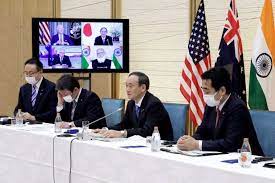WASHINGTON, Apr 9:The distrust of Beijing’s role in the Indo-Pacific region has consolidated the Quad, comprising Australia, India, Japan and the US, a Congressional report has said, noting that Tokyo’s eagerness to pursue it appears driven above all by its concern over China’s increasing power in the region.
The independent Congressional Research Service, in its latest report, said that in 2017, the Trump administration renewed an effort to develop the Quadrilateral Security Dialogue, also known as “the Quad”, a four-country coalition with a common platform of protecting freedom of navigation and promoting democratic values in the region. “The Biden administration has adopted the initiative vigorously, convening a virtual leader-level meeting with Japan, Australia, and India in March 2021,” the CRS said, adding that at this summit the leaders announced a promise to jointly expand availability of COVID-19 vaccines and deliver up to a billion doses to Southeast Asia and the broader Indo-Pacific by the end of 2022.
This step, along with a plan to reduce dependence on China’s near-monopoly on rare earth materials used in high-technology products and to work together to strengthen the Paris Agreement, could usher in a new chapter in cooperation, the CRS said.
“Questions remain about the durability of the arrangement if leadership shifts in member countries, whether other countries will be brought into the Quad’s initiatives, and particularly about India’s inconsistent enthusiasm for the grouping. For now, however, distrust of Beijing’s role in the region has consolidated the Quad,” said the CRS report, which is not considered as an official view of the Congress.
Japan has been at the forefront of pursuing the quadrilateral arrangement, with former prime minister Shinzo Abe in particular championing the concept.
“Japan’s eagerness to pursue the Quad appears driven above all by its concern over China’s increasing power, influence, and assertiveness in the Indo-Pacific region. In theory, engaging India eastward could compel Beijing to divert some of its resources and attention to the Indian Ocean,” the CRS said.
It said Japan has also worked steadily to build closer bilateral security ties with both Australia and India.
For the past decade, Japan has deepened defense relations with Australia, and in 2020 the two agreed to a Reciprocal Access Agreement (similar to a Status of Forces Agreement) to define rules and procedures when troops are stationed temporarily in the other’s country for joint exercises or disaster-relief activities.
As another US treaty ally, Australia uses similar practices and equipment, which may make cooperation with Japan more accessible.
“Japan has inked an Acquisition and Cross-Servicing Agreement (the formal mechanism that allows a country to acquire or provide logistic support, supplies, and services directly from/to another country) with India, along with agreements concerning the protection of classified military information and transfer of defense equipment and technology,” the CRS said.
Bilateral exercises with both the countries have grown in number and sophistication, it said.
Leaders in Tokyo may find the absence of South Korea an additional advantage of the quadrilateral grouping. Tokyo and Seoul often have been at odds and resistant to the US encouragement of closer trilateral cooperation among the United States, Japan, and South Korea.
The Quad provides another venue for Japan’s Self-Defense Forces to increase security exercises with the US military, the CRS said.
In November 2017, India, Japan, the US and Australia gave shape to the long-pending proposal of setting up the Quad to develop a new strategy to keep the critical sea routes in the Indo-Pacific free of any influence. (PTI)
Home International Distrust of China’s role in Indo-Pacific region has consolidated Quad: CRS report


